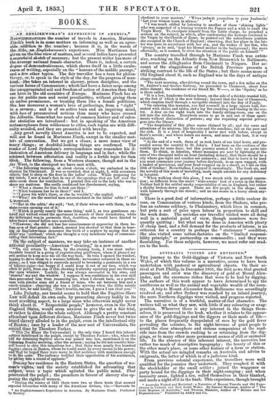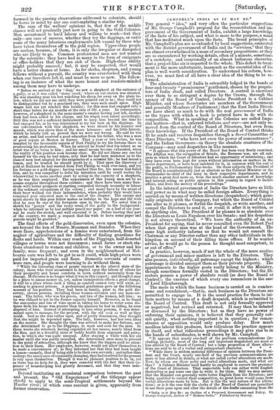AUSTRALIA VISITED AND REVISITED.*
THE journey to the Gold-diggings of Victoria and New South Wales, of which this volume is a narrative, seems to have been undertaken with pastoral or agricultural objects. On their ar- rival at Port Phillip, in December 1851, the first news that greeted passengers and crew was the discovery of gold at Mount Alex- ander, and the enormous riches that were to be had by digging. The authors of this work appear to have determined to spy the auriferous as well as the animal and vegetable wealth of the coun- try. A trip to Mount Alexander from Melbourne was accordingly resolved on ; and after Sydney was reached by an inland journey, the more Northern diggings were visited, and progress reported.
The narrative is of a truthful, matter-of-fact character. The writers tell us what they saw, with little if any colouring or exag- geration. Wherever there is any interest in the things them- selves it is preserved in the book, whether it relates to the appear- ance of the gold-diggings and the diggers or their mode of We- ep the places frequently depopulated of men by the gold fever pervading the colonies, to the night-bivouac of quiet people to avoid the close atmosphere and riotous companions at the road- side inns from the crowds rushing to or returning from the dig- gings, or to many other more permanent scenes of still or animated life. In the absence of this inherent interest, the narrative has rather too much of descriptive topography ; the beauty of this or the other man's place, or some other feature of a farm or station. With the actual are mingled remarks on Australia and advice to emigrants, the latter of which is of a judicious kind. From previous colonial experience, the travellers were well qualified for the journies they undertook. They roughed it with the stockholder or the small settler ; joined the waggoner or party bound for the diggings in their night-camping ; and when necessity arose, lighted a fire, rolled' themselves in their blanket, and made a night of it in the bush: This experience, though brought * Australia Visited and Revisited: a Narrative of Recent Travels and Old Expe- riences in Victoria and New South Wales. By Samuel hiossman, Author of "The Gold Regions of Australia," and Thomas Banister, Author of "Britain and her Dependencies." Published by Addey and Co.
forward in the passing observations addressed to colonists, should be borne in mind by any one contemplating a similar trip.
The sum of the writers' opinions is, that few of the middle classes will act prudently just now in going to the Gold Colonies. Men accustomed to hard labour and willing to work—but they only—are sure of success, whether they try the diggings, or enter some of the many laborious employments left vacant by those who have taken themselves off to the gold region. Upper-class people i are useless, because, of them, it s only the irregular or dissipated who are likely to go. Common professional men are not wanted by the colonists : they have had so many in the form of emigrants or office-holders that they are sick of them. High-class ability might probably succeed; but, it may be suspected, that would have a better chance at home. As for clerks, shopmen, and young fellows without a pursuit, the country was overstocked with them when our travellers left it, and must be more so now. The follow- ing is an instance of what the more honest and resolute-minded among them may have to undergo.
"Before we arrived at the 'Gap,' we saw a shepherd at the entrance of a gully, or as it was called 'stony creek,' where an out-station was situated. He was standing near his hut watching his sheep far away on the plain be- low, which we did not see until they were pointed out to us ; they could not be distinguished but by a practised eye, they were such small specs. High
• wages had not yet reached this locality; for this man had engaged only a short time before for six months at the rate of 204 a year. In consequence, however, of a shepherd in the same master's employ having just left, another flock had been added to his charge, and his wages were raised accordingly. Still this was not a sufficient inducement to keep him beyond the time he had engaged for as he was determined to try his luck at the diggings. In our conversation with this shepherd, we were struck by his manner and speech, which was above that of the mere labourer ; and his little history, which he briefly told us, proved that we were not wrong. He said he was an artist, and had received a good education from his father, who was a man of good repute at Merton in Surrey. That a year or two before, he was tempted by the favourable reports of Port Phillip to try his fortune there in prosecuting his profession. When he arrived he found that his talent as an artist was of no value to him ; and his small means became exhausted, when the reality of his position soon became clear. He did not blame any one but himself for the step he had taken, only that he had been mistaken as to the class of men best adapted for the exigencies of a colonial life; he had learnt a lesson, and he trusted he should profit by it. That upon the discovery of gold at Bathurst he had started from Port Phillip to walk over-land, and try his fortune as a gold-digger ; having reached thus far, his means had failed him, and he was compelled to defer his intention until he could realize the wherewithal to make another start by acting in the capacity of a shepherd, as he was then employed. The experiences of this young man are by no means singular throughout these colonies ; and there have been many hun- dreds with better prospects at starting compelled through necessity to labour at the ordinary occupations of the colony ; and many have by the sweat of their brow worked out their independence, when probably they would have remained poor educated men to the end of the chapter. The energy and spirit shown by this poor fellow makes us indulge in the hope and the wish that he may be one of the fortunate ones in the end. We asked him to sketch his ' gunya ' and the rocky creek of the gully in the background ; when he informed us he had neither pencil nor paper : on a leaf of our jour- nal he made the sketch, and well executed it is. Before leaving that part of the country, we made a request that his wish to have some paper and pencils might be gratified."
The final effects of the gold-discoveries, even upon the colonies, are beyond the ken of Messrs. liossman and Banister. When they . were there, apprehensions of a famine were entertained, from the neglect of agriculture and the difficulty of finding guardians for flocks and herds. Within easy reach of the Diggings, half-deserted villages or towns were not uncommon ; small farms or stock sta- tions abandoned to women and children, or to the owner and his family, were frequent; and even in the neighbourhood of Mel- bourne corn was left to be got in as it could, while high prices were paid for imported grain and flour. Domestic servants of course were rare, and people were learning to do without them.
"While the labouring class of people rejoiced it the altered state of the coleny, those who were accustomed to depend upon the labour of others for their prosperity and house comforts in town suffered materially from the change. Melbourne is no longer what it was in this respect; and though it may be a place to amass money in, yet, unless immigration effects a great change, it will be a place where such a thing as comfort cannot very well exist, ac- cording to general notions. A professional gentleman gave us the following account of his position. They had been in family, prior to the gold dis- covery, eleven persons, including three women-servants and one man-ser- vant. The latter, who was his groom, and two of the women, left him ; so he was obliged to act in the former capacity himself. However, as he found the annoyance and loss of time spent in taking his horse to water some dis- tance from his house was greater than the pleasure he had in riding, he soon disposed of him. Instead of attempting to hire other persons, it was deter- mined upon to manage, for the present, with the old cook as well as they could. And as she was rather aged, and of portly dimensions, they thought that she might be depended upon. The lady, however, had her own ideas on the matter. She thought the time was arrived to make her fortune, and she determined to go to the Diggings, to wash and cook for the men. In three weeks she returned, having expended all her mean; nearly blind from the flies, and in a dreadful. state of bodily health from exposure and priva- tion, to which she was quite unequal. After staying a while with her old master until she was partly recruited, she determined once more to proceed to the point of attraction, although she knew that the diggers paid no atten- tion to their linen. Her employess, however, would not allow themselves to be made a convenience of; so they informed her that they had been taught a lesson—namely, that of being able to be their own servants ; and rather than undergo the annoyance of constantly changing, they had resolved for the present to rely upon themselves. Though it was no pleasant position to be in, yet as there was no help for it, they were consoled with the fact that their ex- penses of housekeeping had greatly decreased, and that they were inde- pendent"
Beyond instituting an occasional comparison between the past and present, the "Old Experienees " of the titlepage appear chiefly to apply to the sema-Tropical settlements beyond the Hunter flyer; of which some account is given, apparently from former observation.



























 Previous page
Previous page